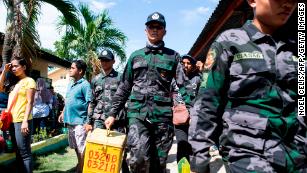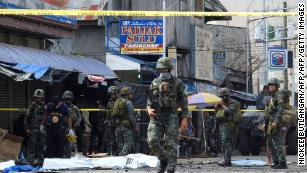
From the Website of CNN NEWS
links: https://edition.cnn.com/2019/01/30/asia/duterte-islamist-extremism-problem-intl/index.html
Philippines vows to 'destroy' Islamist extremism. Here's why that won't be so easy
(CNN)Less than two years after victory was declared over ISIS-aligned militants in Marawi, the threat of extremism has returned to the southern Philippines.
Despite moving forward with a historic deal to provide the region's Muslim population with a high degree of autonomy, the southern island of Mindanao appears to be sliding back into violence, with two bombings -- both deadly -- of religious buildings in under a week.
In response, Philippines President Rodrigo Duterte has vowed to hit resurgent militants hard, but his order to "destroy" the ISIS-linked group thought to be responsible for the bombing of a church on Sunday may prove to be harder than anticipated.
"That is always my order. Destroy the Abu Sayyaf, destroy the (communist insurgent group New People's Army), and destroy the drug organizations. If destroying (means) killing, if you are interested to know, yes," Duterte said, referring to the ISIS-affiliated Abu Sayyaf Group (ASG), which Philippines authorities have claimed is the almost certainly responsible for the Sunday bombing.
For decades Mindanao has been ravaged by a low-intensity separatist conflict that has claimed tens of thousands of lives. In 2017, Islamic State-aligned Filipino and foreign militants laid siege to the city of Marawi in Mindanao for five months.
The ensuing violence forced more than 350,000 residents to flee the city and surrounding areas, as their homes were reduced to rubble by government airstrikes. Many remain displaced more than 16 month after the fighting ended.
This week, ten Philippines army and marine battalions -- a total of about 5,000 soldiers -- have again been activated in the hunt for the bombing suspects.
The country's Defense Secretary Delfin Lorenzano announced Wednesday that airstrikes against Ajang Ajang, the cell within ASG that is suspected of carrying out Sunday's attack, had been launched in Mindanao. Ommal Usop, a suspected Ajang Ajang member, was killed in a raid on a bombing suspect's home Tuesday.
Fortified
ASG has emerged in recent years as one of the most notorious armed insurgent groups in Southeast Asia. The group is believed to be responsible for a variety of recent high-profile flashpoints, from the Marawi siege to less ideologically motivated kidnap-for-ransom schemes, often targeting foreign nationals.
However, analysts say Duterte's order to crush the group, which has remained resilient even after its numbers were decimated through operations to retake Marawi, may be impossible.
"It's clear that ASG has deep roots in the local population and whether we're dealing with people linked to ISIS, or we're dealing with the kidnap-for-ransom industry that ASG is also involved in, we're dealing with a community that directly benefits from ASG operations, in terms of income, social status and political power," said Sidney Jones, director of the Jakarta-based Institute for Policy Analysis of Conflict.
Decades of conflict have left Mindanao among the Philippines' least-developed areas. The Autonomous Region in Muslim Mindanao, where the city of Marawi is based, has the lowest per capita GDP of any region in the entire country.
"The government doesn't function in the Sulu area and in Muslim Mindanao more generally," Jones said.
Historical injustice
The feelings of neglect felt by many in the region are compounded by a historical sense of injustice. Supporters of last week's referendum, which will see greater autonomy granted to a new area called the Bangsamoro Autonomous Region in Muslim Mindanao, encompassing Muslim-dominated parts of Mindanao, hope it will be first step in helping to reverse these grievances.
The new law governing the area's creation, the Bangsamoro Organic Law, gives protections and recognition to the Moro people as the "original inhabitants of Mindanao and the Sulu archipelago and its adjacent islands, whether of mixed or of full blood," including their spouses and descendants.
 |
Philippine vote could finally
ring peace to restive region
|
Speaking to CNN, Darlene Cayabyab, director of operations and research for the Counter Extremism Project, says there are "sensitivities" that the ethnic Moro people have concerning Filipinos from other parts of the country, and which can easily hinder military operations.
"These Moro folks have long felt occupied -- you will have some difficulty with cooperation and collaboration, and winning the hearts and minds of people," she said.
"Decades -- if not centuries -- of grievances have led to an acceptance of jihad."
According to a poll by Malaysia-based Merdeka Center late last year, which measured Southeast Asians' attitudes towards extremism, 6% of Filipino Muslims said they "would use violence or join a violent organization to defend their faith," while more than half of Filipinos polled said they could "justify acts like attacking the police, military or civilians, and agreed that waging war was the only way" to conduct jihad.
"That is something that ISIS knows, and they're going to try and capitalize on that," Cayabyab added.
Inhospitable territory
In addition, historically the government's struggles stem from a lack of capacity, poor coordination and geographical obstacles, with the physical terrain itself a barrier to government forces effectively cracking down on militants in the south.
"There's a lot of (jungle) coverage, not a lot of forces quite understand the terrain. Also in the Philippines in general you have thousands of islands -- the archipelago makes it difficult to control, plus these vast sea lanes which aren't being patrolled as well as they could," Cayabyab said.
The Sulu and Celebes seas between Indonesia, Malaysia and the Philippines are jointly patrolled by the three countries' militaries, but the vastness of the area along with the numerous uninhabited inlets and islands means that policing it is costly, and ineffective at preventing the smuggling of cash, weapons and fighters between the three.
Jones says that the problem is much more ingrained and intractable than Duterte's blunt-force response would suggest.
"The military has consistently viewed killing ASG leaders as the key to weakening or eradicating the insurgency and it's totally counterproductive," Jones said. "Ajang Ajang itself refers to a younger generation of ASG, whose fathers were killed in operations and vengeance is their main motivators.
"It's clear now that you don't solve terrorism with a purely military strategy, and until that lesson is learned we're going to have problems in the Philippines as far as we can see."
CNN Website
Article Links
OTHER HUMAN RIGHTS PROMOTIONS WEBSITES
------------------------------------------------------------------------------------------------
THE GLOBAL WORLD PROMOTIONS
-------------------------------------------------------------------------------------------------
-------------------------------------------------------------------------------
---------------------------------------------------





































0 comments:
Post a Comment